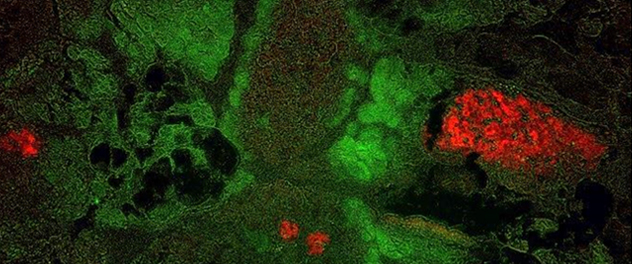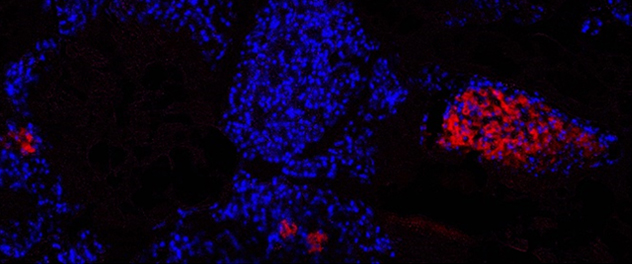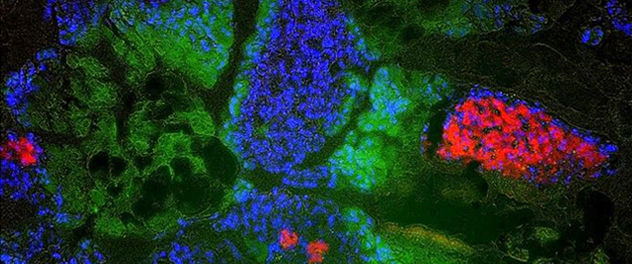-

Dismantling the complex mechanisms of pancreatitis to find a cure
The Pancreatitis and Acute Outcomes Lab shows the uptake of near-infrared 2-deoxyglucose (NIR 2-DG), in green, occurs in areas that undergo necrosis, which mostly lack nuclear detail.
-

Dismantling the complex mechanisms of pancreatitis to find a cure
Dr. Singh's Pancreatitis and Acute Outcomes Lab demonstrates the uptake of near-infrared 2-deoxyglucose (NIR 2-DG) by the exocrine pancreas on a histologic section from severe glyceryl tri-linoleate (GTL) induced pancreatitis, the viable pancreas is shown as intact nuclei (blue).
-

Dismantling the complex mechanisms of pancreatitis to find a cure
Islets, stained red for insulin, are spared from severe glyceryl tri-linoleate (GTL) induced pancreatitis, in this image from Dr. Singh's Pancreatitis and Acute Outcomes Lab.
Overview
The Pancreatitis and Acute Outcomes Research Laboratory, led by Vijay P. Singh, M.B.B.S., at Mayo Clinic focuses on acute pancreatitis and similar diseases, a major cause of emergent hospitalization. Acute pancreatitis is the most common cause of hospitalization for gastrointestinal disease in the United States and is the pancreatic disease with the highest incidence worldwide. Currently, there is no targeted therapy. Previous studies provide clues that the exocrine pancreas has a role in mediating outcomes of several other acute illnesses and exacerbations including burns, trauma, hemorrhage and heart failure.
Acute pancreatitis is unique and mystical, as there are numerous causes with varied outcomes ranging from a short, mild self-limited illness to severe devastating disease resulting in multisystem organ failure, infectious complications, prolonged hospitalization and sometimes death. These outcomes are also noted in other acute or critical illnesses when pancreatic injury has occurred and is otherwise unexplained. These clinical observations make a strong case to study the role of the pancreas in the evolution of these diseases.
Dr. Singh's research team explores the complex mechanisms that cause acute pancreatitis to evolve from organ inflammation to cardiovascular, renal, pulmonary and infectious complications. These studies have contributed to understanding the interactions of the exocrine pancreas with the adipose environment and vital organs.
In-depth studies into acute pancreatitis increase our understanding about several vital aspects of general physiology and pathophysiology, cell biology, inflammation, cell-cell interactions and infectious complications. Based on our research, we developed several clinically relevant disease models that explain clinical and biological behavior, while challenging classical dogmas in scientific thinking. Moreover, the lack of available therapies for pancreatitis and the challenges faced by traditional ways to approach a disease invite us to think outside the box and have led to developing novel therapies that have a high translational potential.
To achieve these goals, we focus on vesicular trafficking and cytoskeletal dynamics in acinar cells, influence of the pancreas on the course of acute diseases, acute inflammatory responses, lipid behavior in aqueous environments and influence on cell function, organ failure, and how sterile diseases can become septic.
Our work challenges classic paradigms by looking at how clinically relevant modifiers can alter the disease course and why targeting the modifier, rather than the cause of a disease, may be more beneficial. These modifiers play a role in sterile to septic transition during acute diseases, and explain the effects of adiposity during such illness much more than do numerical parameters such as waist circumference or body mass index. This work has led to devices that slow deleterious signaling in the pancreas and novel experimental drugs to treat pancreatitis.
About Dr. Singh
Dr. Singh is an investigator focused on clinical gastroenterology and pancreatic disorders. He is a consultant for the Division of Gastroenterology and Hepatology in the Department of Internal Medicine and the Department of Biochemistry and Molecular Biology at Mayo Clinic. He also serves as a professor of medicine at Mayo Clinic College of Medicine and Science in Phoenix, Arizona.